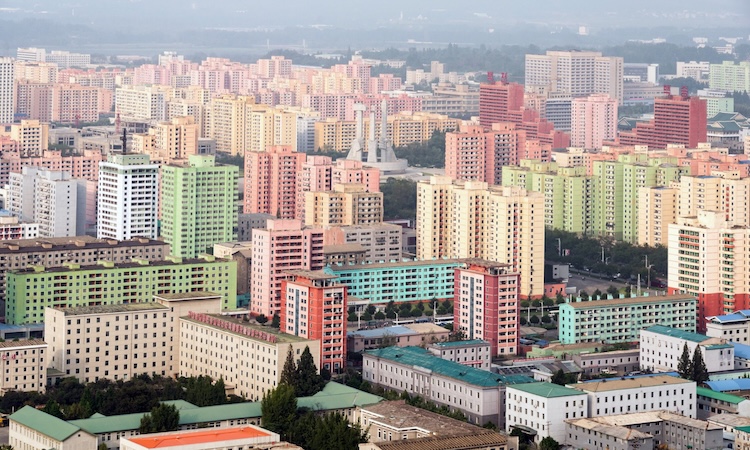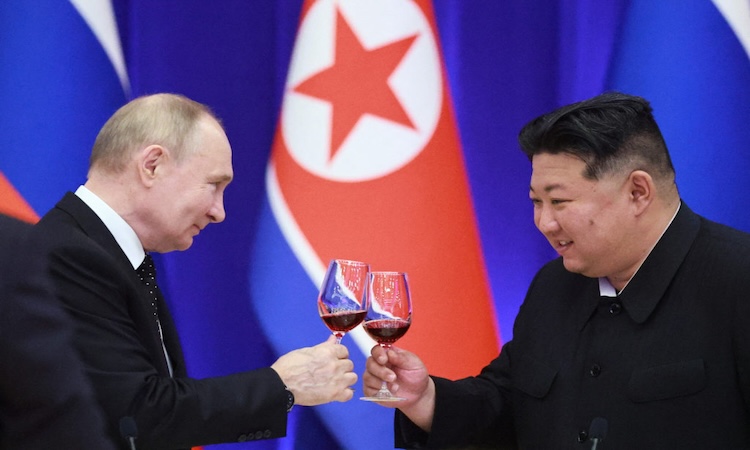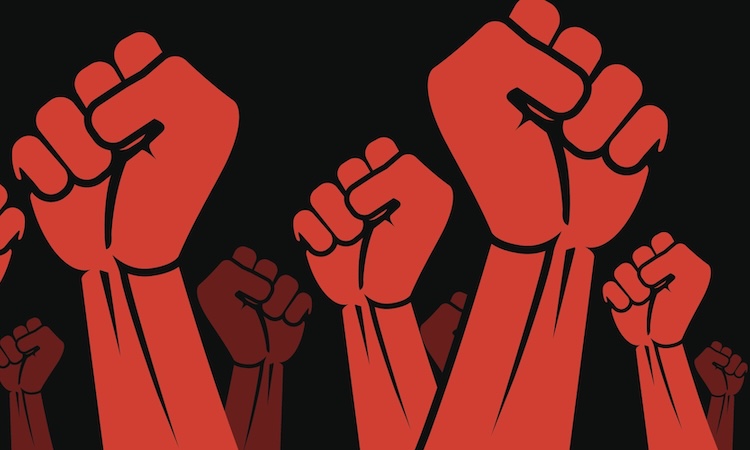Congress notes that it is 200 years since the global capitalist system experienced its first crisis of overproduction, and that, since that time, the whole of humanity has experienced the economic disruption and social dislocation of its periodic recurrence roughly every decade. We note that the incumbent Labour administration has no answer to this most profound crisis of capitalism, despite Labour’s former chancellor Gordon Brown arrogantly claiming in his 2000 budget speech that he had “abolished the cycle of boom and bust”.
Congress notes that it was this very same Gordon Brown, as Labour prime minister in 2008, who led Britain to bail out the banks, in response to the 2008 ‘subprime mortgage’ crisis – a crisis of capitalist overproduction. When the housing market was collapsing; when the stock exchange was plunging and big banks were failing, Brown declared that the private institutions of the billionaire financial elite, the means by which the monopolist exploiting ruling class use their wealth to dominate global production and therefore humanity, were “too big to fail”.
Brown’s mass programme of financial aid from the public sector – principally the taxes of the working people – to the finance capitalists cost the national exchequer an estimated £1.16tn. (Bank reforms: how much did we bail them out and how much do they still owe?, The Guardian, 12 November 2011)
The global bail-out was so large that economists and politicians still argue over its magnitude, in an attempt to hide the extent of their crime. The bailout in the USA alone has been estimated in trillions. (The Special Inspector General for TARP summary of the bailout says that the total commitment of government was $16.8tn dollars with the $4.6tn already paid out [by 2012].) (The big bank bailout by Mike Collins, Forbes, 14 July 2015)
Congress notes that the 2008 ‘subprime’ crisis was a classic overproduction crisis. It followed the ‘bursting of the dotcom bubble’ in 2000 and was followed in turn by the ‘Covid’ crisis, during which not one but two consecutive ‘black days’ (Black Monday, 9 March 2020 and Black Thursday, 12 March 2020) bedevilled the global stock markets and saw billions wiped off their value.
“In total, the Dow Jones Industrial Average bottomed out with a loss of 37 percent of its value in 2020 while the S&P 500 lost 34 percent. Global indexes, such as the FTSE 100 in the UK, the DAX in Germany, and the Nikkei in Tokyo, all posted double-digit percentage declines.” (An international comparison of the cost of energy support packages, Office for Budgetary Responsibility, March 2023)
Donald Trump’s incumbent (first) administration pumped an estimated $3tn to the corporate elite (as well as to other businesses) to prop up their shares, while Britain’s ‘Covid bailout’ was variously estimated between £500bn and £850bn over three years. This was the money from which healthcare, welfare payments and social services of all kinds would otherwise have been funded.
This rampant state spending to prop up failing private companies has resulted in a mountain of government debt, which the working people are paying via taxes, and which has resulted in a period of deepening austerity.
The looting of national assets by capital is just one aspect of the growing polarisation of wealth – a demonstration of the way in which the bourgeoisie is able to use its hold over the state power. But these periods of intense crisis also lead to the killing of many smaller capitalists by the largest. They are periods of intense monopolisation and concentration of wealth.
Deepening poverty, perversely, leads to a decrease in ‘apparent demand’ (demand backed by money). The growing ranks of the destitute and penniless, under capitalism, exercise no demand. Markets stagnate, further reducing demand, deepening and accelerating the global crisis. Consequently, poverty levels and income disparity are worsening – in Britain and globally.
The world’s ten richest men more than doubled their fortunes from $700bn to $1.5tn – at a rate of $15,000 per second or $1.3bn a day – during the first two years of the Covid pandemic that saw the incomes of 99 percent of humanity fall and over 160 million more people forced into poverty.
“If these ten men were to lose 99.999 percent of their wealth tomorrow, they would still be richer than 99 percent of all the people on this planet. They now have six times more wealth than the poorest 3.1 billion people.” (Ten richest men double their fortunes in pandemic while incomes of 99 percent of humanity fall, Oxfam, 17 January 2022)
Wealth inequality is high and rising and more marked than income inequality. In the UK, the bottom 50 percent of the population owned less than 5 percent of wealth in 2021, and the top 10 percent a staggering 57 percent (up from 52.5 percent in 1995). The top one percent alone held 23 percent. (World Inequality Lab, 2022)
The ratio of wealth to income has risen in Britain from 2.3 to one in 1948 to 5.7 to one in 2020. All of which has a significant impact on life chances and outcomes and generates high levels of poverty amongst those with no wealth assets to fall back on. (Changing the narrative on wealth inequality, Joseph Rowntree Foundation, 2024)
More than one in five people in the UK (21 percent) were in poverty in 2022/23 – 14.3 million people. Of these, 8.1 million were working-age adults, 4.3 million were children and 1.9 million were pensioners. To put it another way, around two in every ten adults are in poverty in the UK and around three in every ten children. (Poverty report 2025, Joseph Rowntree Foundation)
Meanwhile, real unemployment – the ‘economically inactive’ portion of the working-age population – in the UK is in excess of 25 percent.
Congress notes that the cause of these stark statistics in the sixth-richest nation on earth is capitalism. And that each one of the crises listed above has been a classical capitalist crisis of overproduction, as vividly described by Engels:
“As a matter of fact, since 1825, when the first general crisis broke out, the whole industrial and commercial world, production and exchange among all civilised peoples and their more or less barbaric hangers-on, are thrown out of joint about once every ten years. Commerce is at a standstill, the markets are glutted, products accumulate, as multitudinous as they are unsaleable, hard cash disappears, credit vanishes, factories are closed, the mass of the workers are in want of the means of subsistence, because they have produced too much of the means of subsistence; bankruptcy follows upon bankruptcy, execution upon execution.
“The stagnation lasts for years; productive forces and products are wasted and destroyed wholesale, until the accumulated mass of commodities finally filters off, more or less depreciated in value, until production and exchange gradually begin to move again. Little by little the pace quickens. It becomes a trot. The industrial trot breaks into a canter, the canter in turn grows into the headlong gallop of a perfect steeplechase of industry, commercial credit, and speculation, which finally, after break-neck leaps, ends where it began – in the ditch of a crisis. And so over and over again.
“We have now, since the year 1825, gone through this five times, and at the present moment [2025!] we are going through it [once more]. And the character of these crises is so clearly defined that Fourier hit all of them off when he described the first as crise plethorique, a crisis from plethora [from plenty, from ‘too much’].
“In these crises, the contradiction between socialised production and capitalist appropriation ends in a violent explosion. The circulation of commodities is, for the time being, stopped. Money, the means of circulation, becomes a hindrance to circulation. All the laws of production and circulation of commodities are turned upside down. The economic collision has reached its apogee. The mode of production is in rebellion against the mode of exchange, the productive forces are in rebellion against the mode of production which they have outgrown.
“The fact that the socialised organisation of production within the factory [and within the global division of labour, operated by the monopolists in their transnational corporations] has developed so far that it has become incompatible with the anarchy of production in society, which exists side by side with and dominates it, is brought home to the capitalists themselves by the violent concentration of capital that occurs during crises, through the ruin of many large, and a still greater number of small, capitalists.
“The whole mechanism of the capitalist mode of production breaks down under the pressure of the productive forces, its own creations. It is no longer able to turn all this mass of means of production into capital. They lie fallow, and for that very reason the industrial reserve army must also lie fallow.
“Means of production, means of subsistence, available labourers, all the elements of production and of general wealth, are present in abundance. But “abundance becomes the source of distress and want” (Fourier), because it is the very thing that prevents the transformation of the means of production and subsistence into capital.
“For in capitalistic society the means of production can only function when they have undergone a preliminary transformation into capital, into the means of exploiting human labour-power.
“The necessity of this transformation into capital of the means of production and subsistence stands like a ghost between these and the workers. It alone prevents the coming together of the material and personal levers of production; it alone forbids the means of production to function, the workers to work and live. On the one hand, therefore, the capitalistic mode of production stands convicted of its own incapacity to further direct these productive forces.
“On the other, these productive forces themselves, with increasing energy, press forward to the removal of the existing contradiction, to the abolition of their quality as capital, to the practical recognition of their character as social productive forces.” (F Engels, Anti-Dühring, 1877, Part 3, Chapter 2)
Congress notes that one need hardly to add more; that while capitalism exists, humanity will continue to be thrown into crises, begetting all the ills of unemployment, misery and want amid plenty. But we note also the following factors that compound and exacerbate the crisis we are now experiencing, making it the most protracted and drawn-out that humanity has known.
- The unprecedented global extent of the domination of imperialism (monopoly capitalism) has drawn the majority of the world’s population and productive capacity into one enormous world market, particularly since the collapse of the Soviet Union and the people’s democracies of eastern and central Europe. The crisis is therefore all-embracing, and there are fewer markets that capital can seek to conquer, more extensively or intensively, in order to escape the crisis.
- The undreamt-of increase in the productivity of labour with modern mechanisation, electrification, information technology, computing, the microchip and microprocessor, telecommunications and enormous advances in scientific, heavy and light engineering, chemical engineering and biotechnology, and scientific technique in general, together with increased automation of many productive processes (robotics employed in factory-line production, complex logic algorithms and so-called ‘artificial intelligence’ employed in the IT sector, accounting, customer service and administrative roles, etc) has decreased the number of working hours and therefore (under capitalism) working people who are needed to manufacture goods sufficient to meet humanity’s needs. Unemployment has risen accordingly, with its consequent downward pressure on wages.
All these advances could and should have been used to lighten human labour and improve human lives, but, as Marx explained in Capital Volume 1, capitalism does not aim to lighten the load of the worker, or spread that toil evenly among mankind, but to maximise profit, at the expense of the working class. The unprecedented increase in productivity therefore intensifies the workers’ misery, and deepens his relative and absolute poverty. (Chapter 15)
- The concentration of the means of production into ever fewer hands, and the global scale of monopolies in general, has meant that the number of real monopoly capitalists in whose hands today’s enormously productive socially-operated productive forces are concentrated is an ever dwindling and numerically insignificant proportion of humanity – who nonetheless play a decisive role in decision-making in production and in global politics and governance.
- The acceleration, since the times of Reagan in the USA and Thatcher in Britain, of the export of capital has transformed not just a few wealthy areas in Britain and France, but the majority of western imperialist country’s populations into “coupon clippers” living as a “parasitic excrescence” on the backs of the labouring and toiling masses of Asia, Africa and Latin America. The percentage of the working population in the UK engaged in productive labour, in manufacture, is at an all-time low – just 8 percent or around 2.6 million of our 68 million population (30 million of whom are actually working, and 43 million of whom are of working age).
- The advent of China’s rise as the ‘workshop too big for the world’ has exacerbated the overproduction crisis of the western monopolists, who find markets are supplied more cheaply and efficiently by the Chinese (this is complicated by the fact that many western monopolists have relocated their production facilities to China), and that their own workforce is on the one hand ‘too expensive’ to employ, and on the other hand has become deskilled. Moreover, China’s technological and scientific advance has surpassed their own in one field after another – and is now poised to do so in the fields of microprocessor (microchip) manufacture and AI programming.
- Britain’s finance capitalists, faced with decreasing avenues for the productive investment of their capital, have turned increasingly to the financing of mergers and acquisitions (corporate credit), and to the field of personal credit extended to the workers, who in Britain and the imperialist world are now carrying an unprecedented level of mortgage, personal loan, credit-card and motor-vehicle finance debt.
Total household debt in the UK now exceeds £2tn – the equivalent to £71,000 per household – and is just below the level of the national GDP (£2.2tn). US household debt is $18.036tn, or $105,056 per household. When the debt cannot be repaid, the banks carrying the ‘bad loans’ – and that is all of them – face crisis and collapse, as in 2008. (Household debt tops £2tn for the first time as new data shows that less than half of UK consumers can correctly answer basic financial questions, Price Waterhouse Cooper, January 2023)
- The advent of the petrodollar as the global reserve currency, linked to and underpinning the other imperialist currencies (pound, Euro) has been fatally undermined by the programme of ‘quantitative easing’ – that is, of inflationary money-printing – which has been intermittently continued ever since the 2008 crisis. This has led to rampant inflation and the consequent ‘cost of living crisis’ (in other words a real decrease in wages, as well as increasing unemployment) that has put downward pressure on the real pay and quality of life of workers in Britain and elsewhere. The resulting decrease in consumption is deepening the crisis of overproduction.
- Since the collapse of the USSR (which gave a temporary reprieve to finance capital from its crises as it looted the wealth of the Soviet Union and people’s republics), the other chief means adopted by imperialism to try to escape its crises has been war. There has been an unending series of post-Soviet neocolonial wars for control of markets and access to cheap labour-power and raw materials. Far from representing the promised “peace dividend”, these have been an expansion of the murderous rampage of the Anglo-American imperialists between the end of WW2 and the collapse of the USSR.
The first intervention in Iraq in 1990 and the destruction and balkanisation of Yugoslavia marked the rosy dawn of ‘peaceful’ post-Soviet imperialism. The genocidal rampage has continued through Sierra Leone, Cote D’Ivoire, Congo, the Sahel, Afghanistan, Sudan, Somalia, Yemen, Iraq, Syria, Nicaragua, Libya, Yemen, Panama – and, of course, Palestine and Ukraine. All these wars and interventions, to the extent of their ‘success’, have tended to reduce their victims to a state of penury and abject subjection. And all of this, despite funnelling trillions of dollars to arms and energy monopolies, has further polarised wealth distribution, intensifying the capitalist crisis.
- The system of destabilisation and sanctions used against independent governments, particularly socialist states, including Cuba and the DPRK, China, Iran, Zimbabwe (after land and mineral nationalisation), Venezuela (after land and mineral, particularly oil nationalisation), etc, has all been used to reinforce and extend the global capitalist system of economic slavery, backed by the ever-present threat of Anglo-American, EU and Nato intervention.
- Nato’s proxy war on Russia (recently admitted as such by Trump’s secretary of state Marco Rubio) was intended to be a ‘brief’ war, culminating in the balkanisation of Russia and the plunder of her resources, as well as those of Ukraine. The economic sanctions that accompanied this proxy war were of international magnitude, and backfired spectacularly.
The expulsion of Russia from the Swift banking system and the unprecedented level of economic sanctions (including the attempted sequestration of some $900bn of Russian state-owned funds held in overseas US and European banks) spectacularly backfired. The US-organised bombing of the Nord Stream pipeline severed European supplies of cheap Russian gas, sending market energy prices rocketing and further exacerbating inflation and the ‘cost of living’ crisis in Britain.
The ‘Ukraine’ war on Russia has cost Britain, besides £12bn in direct weapons supply, increased costs through inflation, energy price hikes and subsidies to the energy companies, in excess of £150bn so far. While the incoming Trump administration heads for the exit, the European imperialists, with a ‘Labour’ leader and government at the helm, are proving themselves further to the right than President Trump and are exerting all their efforts to keep the war going – despite its reckless cost of one million Ukrainian and one hundred thousand Russian lives, and at times bringing the hostile nuclear states of Nato and Russia dangerously close to direct conflict.
Congress is fully cognisant of the fact that capitalism has no answer to this most protracted crisis of global monopoly capitalism and, as we have repeatedly seen, in a desperate effort to save its own skin in the face of its failing economics, the system’s rulers are pushing the world ever closer to the catastrophe of a third all-out global war. Capitalism is a system long passed its sell-by date, and the British working class has everything to gain by its revolutionary overthrow.
Congress therefore resolves to redouble its efforts to:
- Spread this knowledge and popularise a Marxist understanding among the working class.
- Oppose the idea that capitalism is the “end of history”, and that market economics holds any hope for the salvation of humanity.
- Oppose the idea that simple tinkering with the electoral system while preserving capitalist economics offers any hope to the British working class – as is the endless assertion of ‘left’ Labour and its revisionist and Trotskyite hod carriers.
- Oppose the dead hand of Labour social democracy, which is a fully confirmed imperialist party (top to bottom, ‘right’ to ‘left’) and the inveterate enemy of the working class.
- Build a party and movement capable of abolishing capitalism, exploitation and war and of replacing the market and private production with a balanced socialist planned economy that will provide for the ever-increasing material needs of the working class, through our own socially organised and administered production.
- Understand in all our daily tasks, in our outlook and in our attitude to work, that while decades have passed in which it seems that ‘nothing happens’, revolutionary days will come in which those decades of concentrating capitalist misery and wage-slavery are expressed. Our task is to ensure that we are a force capable of giving guidance to the working masses when this moment of systemic political crisis arrives – a moment that the global capitalist economic crisis of overproduction is tending to bring ever closer.
In the words of Friedrich Engels: “Whilst the capitalist mode of production more and more completely transforms the great majority of the population into proletarians, it creates the power which, under penalty of its own destruction, is forced to accomplish this revolution. Whilst it forces on more and more the transformation of the vast means of production, already socialised, into state property, it shows itself the way to accomplishing this revolution.
“The proletariat seizes political power and turns the means of production in the first instance into state property. But, in doing this, it abolishes itself as proletariat, abolishes all class distinctions and class antagonisms, abolishes also the state as state.
“Their political and intellectual bankruptcy is scarcely any longer a secret to the bourgeoisie themselves. Their economic bankruptcy recurs regularly every ten years. In every crisis, society is suffocated beneath the weight of its own productive forces and products, which it cannot use, and stands helpless face to face with the absurd contradiction that the producers have nothing to consume, because consumers are wanting.
“The possibility of securing for every member of society, by means of socialised production, an existence not only fully sufficient materially, and becoming day by day more full, but an existence guaranteeing to all the free development and exercise of their physical and mental faculties – this possibility is now for the first time here, but it is here.
“Only from that time [the rule of the working masses themselves, and a socialist planned economy] will man himself, with full consciousness, make his own history – only from that time will the social causes set in movement by him have, in the main and in a constantly growing measure, the results intended by him. It is humanity’s leap from the kingdom of necessity to the kingdom of freedom.” (F Engels, Anti-Dühring, 1877, Part 3, Chapter 2)
















